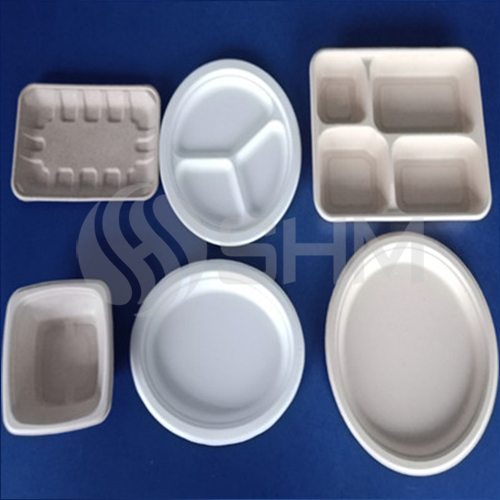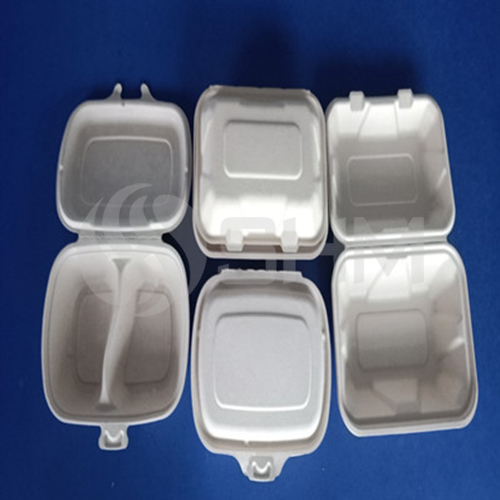In the pulp molding industry, water-proof and oil-proof treatments, spraying agents, dipping agents, and PLA films are commonly used to enhance the resistance of pulp molded products to moisture and oil. Here's an overview of their applications, advantages, and disadvantages, with a focus on their cost-effectiveness:
1.Water-Proof and Oil-Proof Treatments:
Water-proof and oil-proof treatments involve the application of coatings or additives that create a protective barrier on the surface of pulp molded products, preventing water and oil absorption.
These treatments are typically cost-effective and widely used in the industry to improve the functionality and durability of pulp molded food containers.
Advantages:
Cost-effective: Water-proof and oil-proof treatments are often more economical compared to other options like PLA films.
Improved functionality: The treatments enhance the resistance of the products to liquid penetration, making them suitable for containing moist or oily foods.
Enhanced product lifespan: By preventing water and oil absorption, the treatments help maintain the structural integrity of the products during use.
Disadvantages:
Limited biodegradability: Some water-proof and oil-proof treatments may contain chemicals that hinder the biodegradability of the pulp molded products, like solve the problem of fluorine.
Potential environmental impact: If the treatments are not carefully chosen, they may introduce substances that could have negative environmental consequences.

2.Spraying Agents:
Spraying agents are water-based coatings that are sprayed onto the surface of pulp molded products to provide water and oil resistance.
These agents create a protective layer that repels liquids and enhances the barrier properties of the products.
Advantages:
Effective moisture and oil resistance: Spraying agents form a barrier that prevents liquid absorption, maintaining the quality of the product during use.
Versatility: Different types of spraying agents can be used to achieve specific requirements, such as different levels of water and oil resistance or specific visual effects.
Disadvantages:
Potential environmental impact: The choice of spraying agents should consider their impact on biodegradability and environmental sustainability.
Additional production steps: Applying spraying agents requires additional equipment and processing, which can increase production complexity and cost.

3.Dipping Agents:
Dipping agents are coatings applied by immersing or dipping the pulp molded products into a solution.
These agents provide similar benefits as spraying agents, offering water and oil resistance.
Advantages:
Effective water and oil resistance: Dipping agents create a protective layer that prevents liquid absorption, ensuring product integrity.
Customization options: Dipping agents can be used to add color or decorative patterns to the products.
Disadvantages:
Environmental considerations: The impact on biodegradability and environmental sustainability should be evaluated when selecting dipping agents.
Additional production steps and equipment: Dipping requires specialized equipment and can add complexity and cost to the production process.
4.PLA Films:
PLA films made from polylactic acid are biodegradable and compostable materials that can be used as a surface covering for pulp molded products.
PLA films provide excellent water and oil resistance.
Advantages:
Biodegradable and compostable: PLA films contribute to environmental sustainability as they can break down naturally.
High water and oil resistance: PLA films offer excellent barrier properties, ensuring the products remain intact when in contact with liquids.
Disadvantages:
Cost: PLA films can be more expensive compared to other water-proof and oil-proof treatments.
Recycling and disposal considerations: PLA films require specific recycling facilities and processes for proper disposal.
While water-proof and oil-proof treatments are currently considered a cost-effective solution in the pulp molding industry, it is crucial to balance cost-effectiveness with environmental sustainability. Manufacturers should strive to choose treatments and materials that meet both functional requirements and ecological considerations, promoting the production of sustainable and eco-friendly pulp molded products.
As a professional pulp molding solution provider, SHM's participation in the formulation of industry standards for China's disposable food container production line demonstrates a commitment to promoting sustainability and high-quality standards within the pulp molding industry. By focusing on cost-effective yet environmentally friendly options, SHM can contribute to the production of pulp fiber sustainable tableware.
It's important to note that the selection of water-proof and oil-proof treatments should be based on a comprehensive evaluation of factors such as cost, functionality, environmental impact, and regulatory compliance. Striking a balance between cost effectiveness and sustainability will help drive the industry towards more eco-friendly practices while meeting market demands for moulded pulp tableware manufacturing.